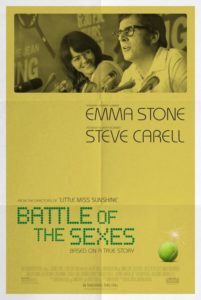Film Review: Battle of the Sexes

For most of its 121 minutes, Battle of the Sexes feels like a right-wing parody of feminism. Its chauvinists are shamelessly direct with their contempt for women’s tennis (and often for women doing anything outside the kitchen or bedroom), much of the film’s good-character dialogue is wordy and moralistic, and those who support female equality and sexual liberation are portrayed as humorless, pedantic, and self-righteous.
Battle of the Sexes is based on the 1973 tennis match between Billie Jean King (played by Emma Stone) and Bobby Riggs (Steve Carell). King was one of the world’s best female tennis players as well as a spokesperson for women in professional sports; Riggs was a former Wimbledon champion with a gambling problem and an impatient attitude toward dullness.
The idea for the match was Riggs’s. He was bored with the senior men’s tennis circuit and probably needed the cash that a big spectacle like man vs. woman would provide to pay off mob debts. In the decade of Roe v. Wade and the Equal Protections Amendment, Riggs rightly bet that America would be keenly interested in seeing an iconic woman humbled on national television. King initially declined his offer, so he played Margaret Court (Jessica McNamee) instead. Riggs’s decisive victory was seen as not only a humiliation for Court but for women’s tennis as a whole. (Riggs “playfully” mocked female tennis players afterward with comments like, “I want to prove that women are lousy, they stink and they don’t belong on the same court as a man.”) Annoyed by the implications of Court’s defeat, King agreed to play Riggs, and four months later she beat him in front of 30,000 spectators and 50 million television viewers.
King’s win is still debated by sports experts and lamented by conservatives. Riggs was fifty-five, out of shape, and sustaining himself on faddish “nutritional” pills, so King’s athleticism and aggressive playing style giving him trouble should have surprised no one. Yet it did. Recently, it’s even been claimed that Riggs bet against himself and threw the competition. Battle of the Sexes addresses this theory by having Riggs call his bookie and put fifteen grand on himself rather than on King. It’s a subtle handling of a dubious allegation. Unfortunately, it may be the only subtle thing in the entire film. King’s flirtations with her hair dresser, for example, are awkwardly tactless. Not because of the acting—Emma Stone does a great job suggesting a romantic connection with just her facial expressions—but because the camera lingers on their interactions far too long. A few seconds is plenty of time to establish the potential for an affair. The director, however, evidently thought it required an uncomfortable eternity.
Some have drawn parallels between the King-Riggs feud and the 2016 election: King the ambitious, ceiling-smashing professional; Riggs the loudmouth, has-been grifter. The problem with the analogy is that Riggs’s misogyny was largely a burlesque, however cruel. President Trump’s misogyny, on the other hand, has all the comic limitations of fanatical madness. He can’t get past the short sneer or sarcastic remark without getting himself all flustered. Riggs suffered the dilemma of all light-hearted eccentrics: When pressed for sincerity, he was never sure whether to double down or tell the truth. Fortunately for him, he never ran for president so it didn’t really matter. Riggs and King were friends until he died at seventy-seven. One suspects the Clinton-Trump friendship won’t be mended anytime soon.
Trying to share a serious message in a film based on historical events is difficult enough, but Battle of the Sexes also tries to be playfully entertaining too. Regrettably, it fails at all three. Billie Jean King is a sports icon—the equivalent in progressive merit to Muhammad Ali or Jackie Robinson. She was the face and voice of female and lesbian dignity at a time when embracing those identities meant being greeted with intimidations to be neither seen nor heard. She deserves a proper cinematic biography. It’s a shame Battle of the Sexes isn’t it because Stone shows brilliant glimpses of being able to capture both King’s idealism and intensity. Combining the poor sports choreography of Rocky, the sexual drama of The Room, and the self-aggrandizing erudition of The West Wing, Battle of the Sexes reflects a regrettable tendency in Hollywood: that so long as a film is on the right side of history, it can do no wrong.
